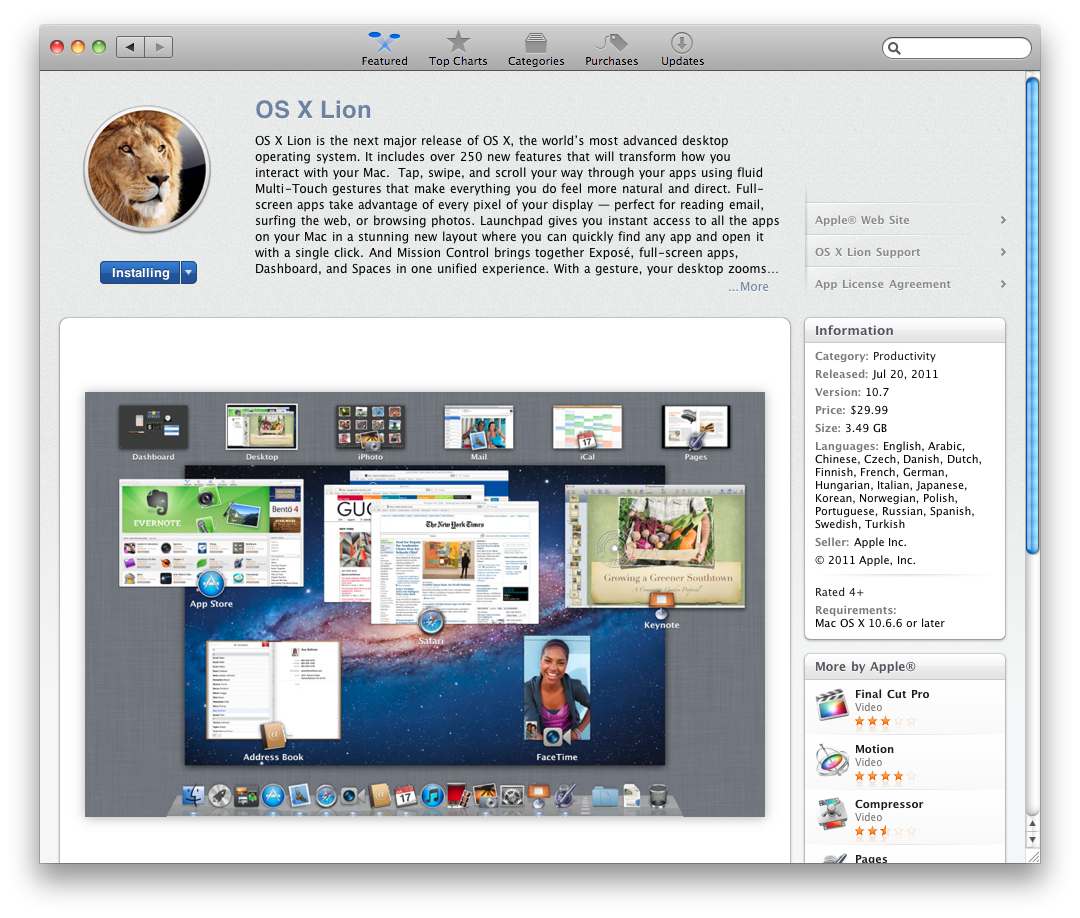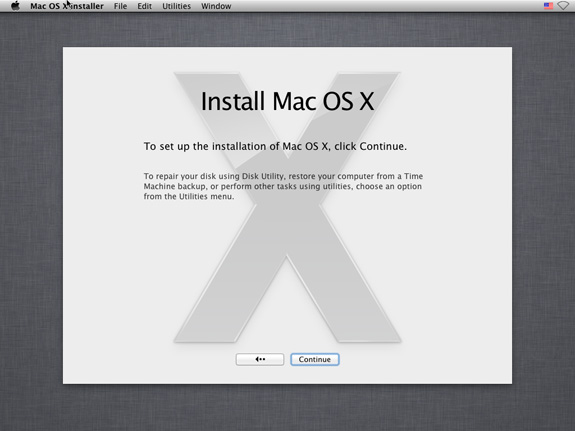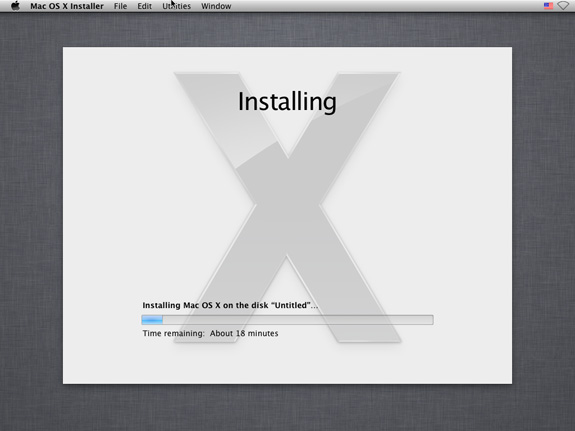Back to the Mac: OS X 10.7 Lion Review
by Andrew Cunningham, Kristian Vättö & Anand Lal Shimpi on July 20, 2011 8:30 AM ESTLion is, as has been well-publicized, not being offered in stores on any install media – to emphasize all of the shiny new imported-from-iOS features, users have to download and install it from the Mac App Store. That said, Lion will be eventually also be available on a USB drive for $69 if you still want a physical copy or don't want to back the installer image up to one yourself.
We’ll talk about the installer itself more below, but the main wildcard in the Lion install process is the roughly 4 GB download from Apple, which takes quite a bit of time over a fast connection (and will take the better part of a day on a slower DSL connection). I’m writing this before the fact, but I’m willing to bet that the load on Apple’s servers is making the wait even more irksome for Apple’s early adopters.
A 3.49 GB download is a big one, but it’s slimmed down significantly from the Snow Leopard installer (my standard 10.6.3 Snow Leopard DVD is about 7.3 GB in size). This isn’t the product of optimization on Apple’s part, but rather the effect that the download-only decision has had on the rest of the OS: many components that were previously bundled (whether by default or optionally), including print drivers and the Java runtime environment, are now downloaded on-demand. Whenever you install a program or device that needs to make use of one of these elements, Software Update pops up and prompts you to download and install it. This can be annoying (what do you mean I need to wait for a separate download before I can play Minecraft?!), but it seems reliable enough, and it does ensure that you’re using the most recent version of whatever component it is that you’re downloading. Other disk space savers include the removal of many older OS X wallpapers (some of which have been with the OS since its inception) and the decision to make the Windows support files for Bootcamp a separate download (as they already are for Macs without optical drives).
Annoyances aside, I do think the move away from physical media is the right one for Apple to make – it reduces cost, it enables them to drop optical disk drives from more of their computers going forward, and it brings greater parity to the OS X and iOS install processes, one of many steps that Lion takes toward the potential merging of the two operating systems.
For those of you who are attached to an install disk for one reason or another, accessing the .DMG file within the Lion installer and burning your own DVD is fairly trivial for even a moderately technical user. The installer, like other App Store downloads, is dropped in your Applications folder. Right-click (or CTRL-clicking, depending on your setup) the installer, click Show Package Contents, go into the Contents folder, then the SharedSupport folder, and burn the .dmg file you find here to a DVD (or copy it to a USB stick) with Disk Utility.
It’s not something every user will want to do, but advanced users or people who reinstall their OS often may want to take advantage of it (especially since Apple's official line, in the event that you need to reinstall OS X to a brand-new hard drive, is to first install Snow Leopard, and then install Lion). It should be noted that this is also the easiest, most convenient way to do a clean install of Lion, which is not offered as an option in the standard installer.
Once launched, the Lion installer will ask you some questions about setup, spend some time unpacking files to your hard drive, restart your computer, and then do the rest on its own - OS X’s in-place OS upgrades are usually a bit smoother and a bit easier to recommend than Windows’, though that can vary based on the amount and type of files on your hard disk and your specific configuration. I never ran into issues throughout my testing, but your mileage may vary.













106 Comments
View All Comments
quiksilvr - Wednesday, July 20, 2011 - link
$29 is indeed a solid improvement. However, given the Mac Store now being out there, their desktop OS should follow the formula of their mobile OS: Free to upgrade. These features are nice but I can't help shake the feeling that these are Service Packs (because they are). And with their "app" store available on the OS and the means of most of their cash inflow, it makes more sense to make this a free upgrade for everyone instead of a $29 upgrade.xype - Wednesday, July 20, 2011 - link
Service packs? Are you serious? Read up on the changes and try to come up with one service pack that changed as much.Some people…
danielkza - Wednesday, July 20, 2011 - link
XP SP3 would be a good candidate, but yes, 10.7 is a bit beyond what one could reasonably call a Service Pack.Taft12 - Wednesday, July 20, 2011 - link
You're thinking of XP SP2, and if you have to go back 7 years to come up with a comparable "service pack", it's certainly fair to say OSX 10.7 is more than a service pack.AfroPhysics - Friday, July 22, 2011 - link
I fail to see how the age of the service pack matters. Xype asked for an example and qualified nothing.ltcommanderdata - Wednesday, July 20, 2011 - link
Are we really going through the tired argument that every 10.x update to OS X is just a service pack and should be free? Then at what point should Apple try to recoup costs for OS development, because even if individual point updates are evolutionary, going from the original 10.0 to 10.7 has got to be a major change in anyones eyes. And the same questions could be raised about Windows NT 6.1 aka Windows 7 where the server version is bluntly labeled Windows 2008 R2 and Windows NT 6.0 aka Vista/2008 or Windows NT 5.1 aka XP and Windows NT 5.0 aka 2000.Besides, even if you discount the user facing changes, Lion has seem some major security infrastructure changes. Both the 32-bit and 64-bit kernel have been rewritten with full NX-bit and ALSR support as in place in Windows Vista/7 addressing the major security complaint Charlie Miller had with OS X. Application sandboxing frameworks are now available and soon to be mandatory for Lion apps in the Mac App Store which I believe is a security feature that even Windows isn't pushing yet. With the dropping of the Core Duo, the Lion has also be rewritten to make more use of SSSE3 instead of just SSE3 as pointed out by the Hackintosh community. Lion isn't just Snow Leopard with a few features added on top, but the entire OS has seem updates at a low level even if the user might not necessary see all the differences.
ltcommanderdata - Wednesday, July 20, 2011 - link
And about the App Store being a major source of income for Apple, Apple has consistently said they aim to run their stores as a break even venture.http://www.macrumors.com/2011/07/19/apple-reports-...
I'm not clear if the iTunes Store in the graphic in the above link includes the App Store, but at the very least as an example of Apple's digital store, the revenue stream really hasn't increased in the last 2 years. Apple's sales growth is clearly from their hardware, iPhone, iPad, and even Mac.
GotThumbs - Wednesday, July 20, 2011 - link
$1,634,000,000 in revenue from Other Music Related Products and Services (3)(3) Includes sales from the iTunes Store, App Store, and iBookstore in addition to sales of iPod services and Apple-branded and third-party iPod accessories
I'd say their goal of a break even venture is not an accurate description of their stores. Hence the creation of the MAC Store. It sounds like a nice thought, but Apple is in business to make money and it seems their VERY good at it. Perhaps their projection analysis was a bit off.
Hey, this is good news for the investors and I understand that they are a business. Lets not be too naive and just don't drink the cool-aid.
ltcommanderdata - Wednesday, July 20, 2011 - link
Perhaps my finance terms are wrong, but I'd hope the Apps Store is taking in revenue. But if Apple should be offering some of their other products like OS X updates for free, shouldn't we be concerned with whether the App Store is making major profits, such that there is money to spare to pay for OS development?solipsism - Wednesday, July 20, 2011 - link
Revenue ≠ ProfitThey've paid billions to both developers, and music and video cotent owners. They've also spent money on the infrastructure to support their stores. I'm sure they're making a profit as all good for-profit companies should, but it's not the cash cow you've attempted to present here.